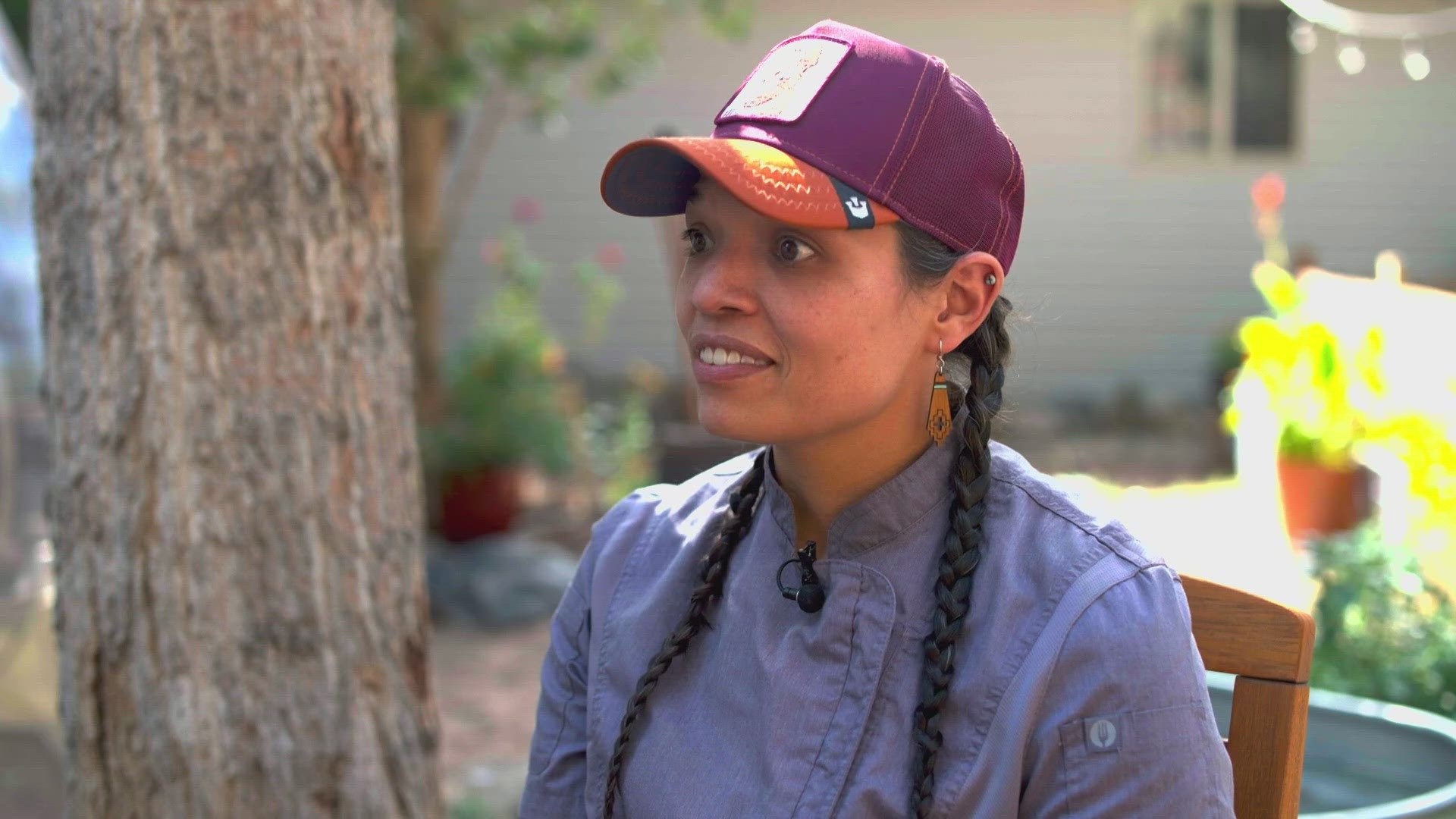ARVADA, Colo. — A business venture quickly turned into a form of self discovery for one Indigenous chef.
"I'm a transracial adoptee from Caracas, Venezuela. We believe my indigeneity is from the western side, San Cristobal region of the country," said Andrea Condes, owner of the Arvada-based Four Directions Cuisine. "I really set out on very much a personal journey, and I was utilizing food to explore that."
Condes' parents were in the military and adopted her while they were stationed in Caracas. She has limited information about her background, other than a birth certificate in Spanish.
"My parents got me the good old fashion way, from an orphanage," said Condes.
She grew up in Ohio before later relocating to the Denver area.
"Growing up, I had minimal exposure to Latin American cuisine," said Condes. "Of course, it was always through the lens of what my parents saw while they were in the army. So most of what I learned came later in life, particularly as an adult, like even after culinary school and all of that, a lot of self curiosity and research."
From a result of her self-exploration about her background from the Andes region, Condes launched The Rooted Andina, a series that includes either dinner or brunch out of her home in Arvada. 'Andina' refers to someone from the Andes in Spanish.
"The Rooted Andina is the culmination of my personal journey, what I have learned about myself as an Andean, what the old Andean culture is, and combining that with the beautiful land that we get to live on here in Colorado, and really showcasing local and Indigenous from across the nation and even across the Americas on a plate in a menu and tracing that ingredient in crop etymology," said Condes.
The Rooted Andina was launched alongside Condes' partner, Alejandra Tobar, who typically runs front of house during the meal while Condes creates the meals. Together, the two have perfected the service for the meal that includes up to 12 people.
They also harvest the land at their Arvada home by cultivating the ingredients in their front yard. It's part of the Pachamama 5453 project. 'Pachamama' is the word for 'Earth Mother' in both the Aymara and Quechua languages. 5453 refers to the elevation at which they grow at their home in Arvada.
"We're drawing parallels between high altitude farming here in Colorado with a comparable elevation in the Andes, and seeing what does well, what doesn't do well," said Condes.
What they grow in their garden is then used as part of the meals they prepare during The Rooted Andina.
"It is an opportunity for a transformative dinner where you can connect and feel a part of something," said Tobar. "I think that if there's any moment that someone can have a tiny bit of 'aha' that feels both refreshing and familiar in a way, I think that there's this kind of loosening. There's a yielding that happens."
Guests who participate in the meals are escorted through the couple's garden while learning about the crops, how they're grown and how they might be used as an ingredient. Tobar will also share what kind of healing powers the crops are believed to hold.
"We have crafted an experience that is both satisfying and beautiful and nourishing, where you feel full but not heavy, and maybe you've met a friend," said Tobar.
Tobar and Condes want people to understand Indigenous cuisine as more than just a singular cuisine, but as something that can vary from tribe-to-tribe or region-to-region.
"I think that there's a lot of I've heard Andrea talk about how specific we can be in talking about Indigenous food," said Tobar. "When we speak that specifically, there's so many threads of conversation about what Indigenous food can be and Indigenous foods and practices."
Tobar joins in as a fellow Andina, being from Chile, home to the Andes mountains as well.
"[Andina] is a term that we rise into both, I think, to remind us of our roots, of our opportunity to be guests on this land and to serve and to show up in the most powerful way that we can," said Tobar.
Guests who attend the dinner will experience a five-course meal. In the next upcoming series the dishes include: tomato salad with tomato, radish, corn broth and cilantro; arepas with Colorado bison, salsa macha and cabbage; roasted carrot soup with guajillo, radish, carrot top oil and elderberry; and sweet potato pudding with chili, maple, pecan and pepita brittle.
"Holy moly. The food is so good. It’s clean. It’s complex," said guest Whitney Wise.
Wise said it was through Andrea that she began to learn more about Indigenous food and where it comes from.
"It’s not Indigenous food in the sense that it’s a cuisine. It’s our food, and it’s the food that grows in our backyard," said Wise. "People are eating this but to eat it in more of a pure and natural way and elevate it in a way that people notice."
Other guests have had more exposure to Indigenous food. Guest Tara Carter says her first exposure to Indigenous food was in Mexico.
"It’s really about the locality, so most of the themes that are being made are from this area of Colorado or sometimes like the four corners, like we are in this unique sort of geography where we have a lot of different tribes, a lot of different Indigenous tribes," said Carter.
If you'd like to try one of the meals Condes and Tobar are putting as part of the Rooted Andina or any of their other events, you can find more information about pricing and dates here.
The couple also puts on programming for youth to educate them as well.

